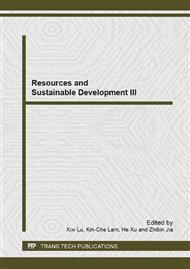p.1468
p.1472
p.1476
p.1480
p.1485
p.1490
p.1495
p.1500
p.1504
A Research Framework of Green Consumption Behavior Based on Value-Belief-Norm Theory
Abstract:
In recent years, China economy has been developing in a high speed, but along with the development, there are some environmental problems such as environmental degradation etc. To solve the environmental problems, we can’t only depend on the government policy, or the enterprises’ production of green products. What is more important is to promote green consumption behavior of consumers. This paper tries to explore the mechanism of individual green consumption behavior based on the theory of value-belief-norm, aiming to build the research framework for individual green consumption, which will be significant to the further research of the individual green consumption behavior and the promotion of green product.
Info:
Periodical:
Pages:
1485-1489
Citation:
Online since:
June 2014
Authors:
Price:
Сopyright:
© 2014 Trans Tech Publications Ltd. All Rights Reserved
Share:
Citation:


